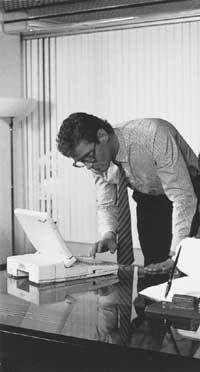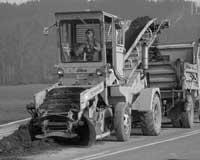Work… is it health?
Many of the diseases and disorders we usually suffer are the result of our work, let's say it clearly. "In general," says Dr. Francisco Javier Sánchez Lores, president of the Association of Specialists in Occupational Medicine, "the necessary measures are not taken to prevent our health from deteriorating while we work, since we normally have very little information about the risks arising from work. Women in general, and based on my own experience, are more cautious than men and care more about knowing their work environment. And on the other hand, when educating in occupational health they respond better than men."
Thousands of cases

As it is easy to understand, there is no reliable statistics to know the number of people suffering from a disorder or disease derived from their work, since in many cases the alteration or pain are not attributed to the profession.
It is recognized, however, that at present there is no professional or official category that is freed from it, and that the attacks are thousands worldwide, whether architects, carpenters, doctors, masons or mechanics. Because certain attitudes or postures, the work situation and movements that are constantly repeated are in many cases the cause of muscle problems and injuries that have no solution.
Lanbide, looking for risk
Let's look at some professions one by one, highlighting the medium-term or short-term risks that your exercise may entail.
Office
Among the occupational risks in the offices are the so-called ergonomic ones, that is, those that appear due to the poor design of the work tools: musculoskeletal disorders, back pain, collars or pain in wrists and elbows. If they remain uncorrected for a long time facilitate the appearance of osteoarthritis.
The visual disturbances produced by the use of the computer stand out every day more. Psychosocial risks are becoming increasingly important (boredom due to poor organization of work, inadequate schedule, load, etc. ). ). Psychosomatic pathology is usually mainly depressions (with different degrees of severity), anxiety, stress, digestive disorders, insomnia or insomnia, … If you work in the office:
- Once sitting in the chair, fill or occupy the entire seat, keeping the back straight against the back of the chair. A footrest will help you maintain your posture better. To relieve pressure in the neck area (cervical vertebrae) turn or rotate with the head forward, backward and sideways.
- Grab the phone with your hand and not between your shoulders and your ear.
- When you're in front of your computer, don't wear glasses with dark glasses. Wipe the screen frequently as fingerprints can produce light reflections. The same goes for white or very light clothing. The minimum distance between the eyes and the computer screen will be 50-70 cm.
- The air should not be too heavy (therefore be careful with cigarette smoke), as it can cause eye irritation or respiratory disorders.
With chemicals

Solvents, chemicals, paints, etc. in your profession. if you use them or are in a cleaning service, first you have to read the instructions and instructions that all the packaging has. The appropriate use of personal protective clothing, such as gloves, masks or glasses, is then essential.
There are chemicals (not all, of course) that can affect the nervous system and can be carcinogenic, such as solvents. If you have to use them frequently, it is advisable to protect them whenever possible, using gloves and costumes. With this protective measure you will avoid the most serious effects of this specific chemical, as well as other lighter as dermatological.
Hairdressers or beauty salons
The components of some products used by professionals of this trade can cause skin lesions. The use of gloves is therefore essential. On the other hand, and due to repetitive movements, persistent and relatively strong pains can appear on wrists and fingers. If this happens, try to have these joints rest from time to time and at that time perform small rotation exercises on the wrists applying heat. Whenever you can and to avoid overloading your spine, work sitting and use comfortable shoes.
Supermarkets or assembly chains
Usually people working in these places spend many hours standing. Working upright in a dynamic position, i.e. running, does not generate special problems. The damage is due to the fact that it remains still for many hours, destroying the venous system (especially the veins of the leg), whether male or female, appearing varicose veins, venous insufficiency, edema in the ankles and eventually even skin disorders (up to ulceration). The spine also suffers, especially in the lower back.
How to oppose it? Take specific walks to accelerate blood circulation. While standing at work use a footrest that will give rest to your back.
For those on the road

As a culmination of a brief review of the different professions, we will analyze the case of those who perform most of their work hours on the road. It is well known that professional drivers (whether trucks, taxi drivers or other drivers) have a special risk of circulatory, heart, digestive attacks, ulcers, constipation and deafness.
They are advised to take walks in their free time, not always carry the open window when driving and be careful with coffee, alcohol and heavy and heavy meals.
Basic rules
- If you notice any sore extremity, rest and apply heat.
- If possible, use ergonomic tools and tools adapted to the human body.
- Avoid uncomfortable or broken postures and if you make many repeated moves, stay occasionally.
- Whatever your profession, you should never keep your arms above your
shoulders.





